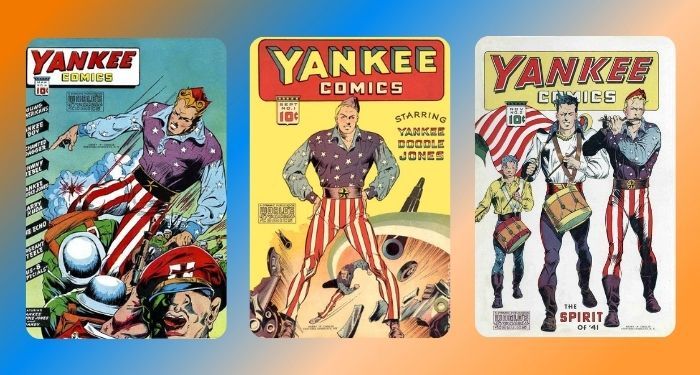
This content contains affiliate links. When you buy through these links, we may earn an affiliate commission.
You’ve read about Captain America and his less-successful patriotic compatriots. You’ve read about Captain Battle, one of the weirdest of Cap’s less-successful knockoffs. Now it is time for you to read about an even more obscure ripoff of our favorite sentinel of liberty: Yankee Doodle Jones!
Both Yankee and his sidekick, Dandy, debuted in Yankee Comics #1 in 1941. If you have seen Captain America: The First Avenger or are even vaguely familiar with Cap’s beginnings, Yankee’s origin story will look suspiciously familiar. Yankee’s story does add two unique elements, however: ableism and stupidity. (I blotted out a potentially offensive word in the first panel; that’s not a glitch in the image.)
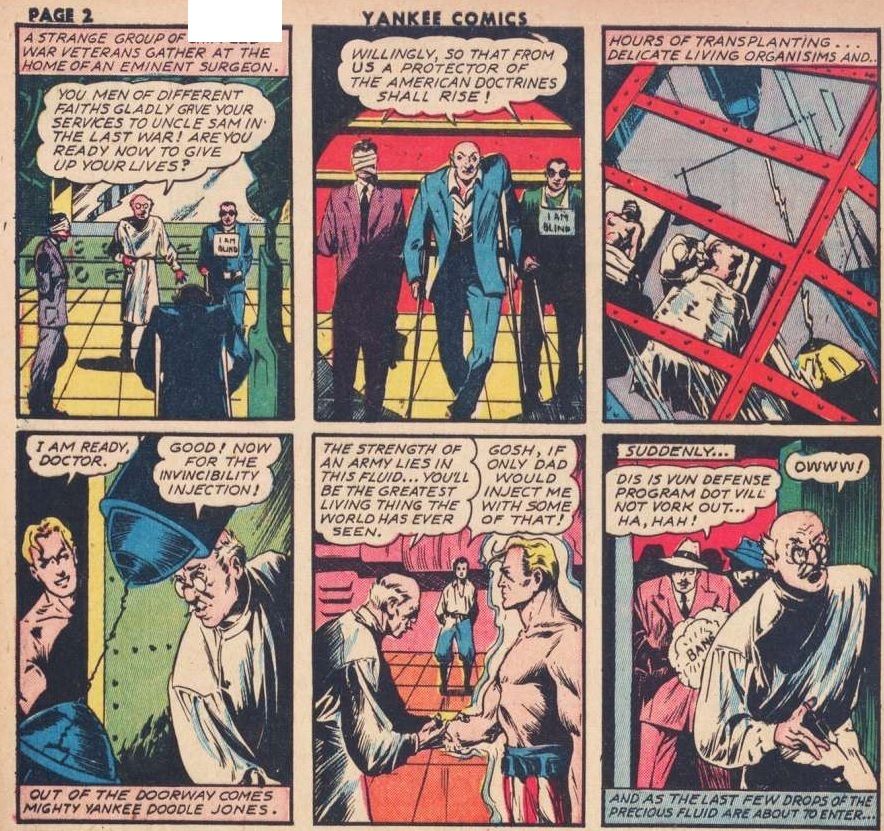 “Organisims”
“Organisims”
You really could just publish anything in the ’40s, huh.
Look, it’s one thing if you wanted your franken-hero to be made of organs from dead war veterans. I mean, that’s still creepy and terrible and you should go to jail immediately. But taking organs from living, disabled veterans because, apparently, the only way they could ever be of use to society is to die is a whole other level.
The Stack Newsletter
Sign up to The Stack to receive Book Riot Comic’s best posts, picked for you.
Thank you for signing up! Keep an eye on your inbox.
By signing up you agree to our terms of use
Moving on, turns out Dr. Dead Scientist had a son, who was somehow allowed to watch this operation live and in person. Distraught, the kid injects himself with some leftover serum to become Dandy, Yankee’s sidekick, and avenge his father’s death. Neat, a two-for-one deal on bargain bin heroes!
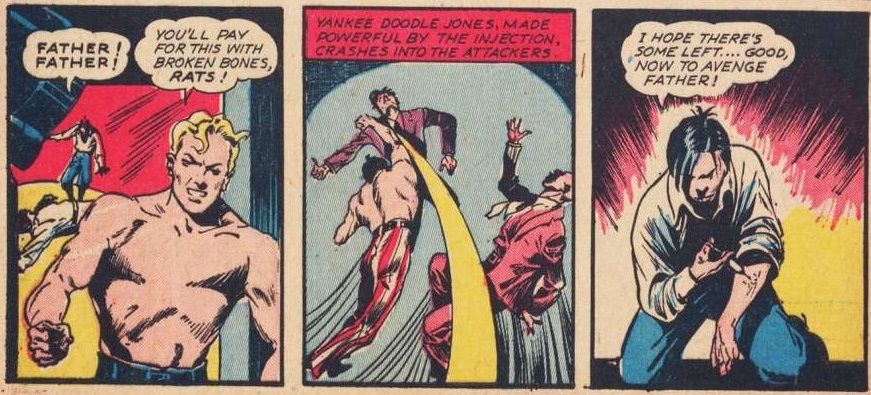
This whole origin plot is over in about two pages. The rest of the story is about an old witch employed by the Nazis who uses voodoo dolls to strangle people with their own hair clippings. Yankee escapes this horrible fate by…whistling.
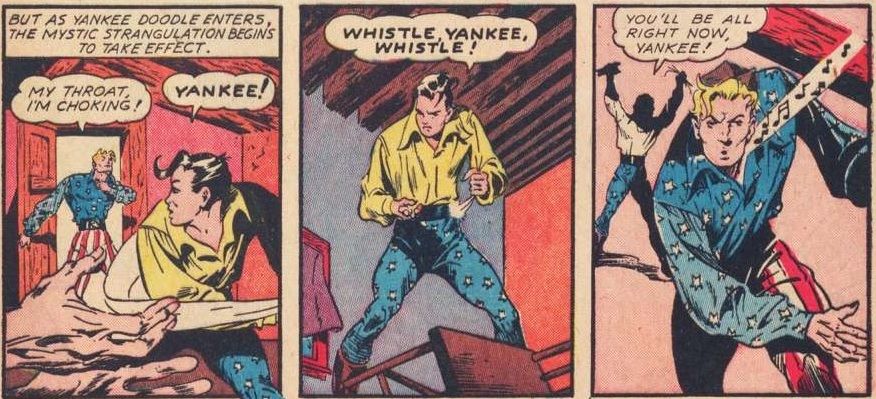 They don’t tell us what tune he whistles, but I think we can all guess.
They don’t tell us what tune he whistles, but I think we can all guess.
Is there some kind of superstition about how whistling cancels out voodoo that I don’t know about? Did Yankee get a lip transplant and now he has special whistling powers?
Please remember that this is only the first issue. There is more where this came from. It does not get better.
You Can Start the Body Count Now
The second issue’s plot involves a Nazi posing as an American doctor soliciting blood donations for a “bleeding sister democracy” overseas, probably England. Turns out the fake doctor was using the clinic to infect everyone with rabies, but he also just attacks people with rabid dogs? Not a very focused plan, is it?
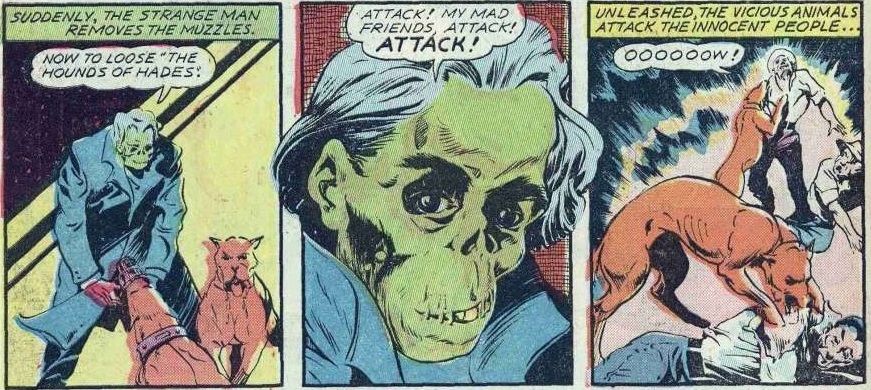 You should smile more. You look cute when you smile.
You should smile more. You look cute when you smile.
They defeat the guy by pulling off his mask like he’s a Scooby-Doo villain, except Scooby-Doo did a better job of setting up suspects. (The Nazi’s name, Hanfred Sapp, was never even implied before now. A shame, because it is a gloriously terrible name.) Yankee talks about getting the rabies victims medical help, blithely ignoring the fact that there is no cure for rabies. All those people are dead now. But at least Uncle Sam brings Dandy some chocolate cake.
(Uncle Sam exists in this comic, mostly to praise them for being such darn good Americans. And Dandy really likes chocolate cake. It’s a whole thing with him.)
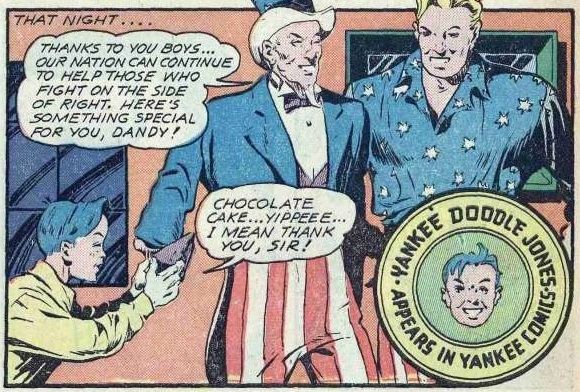 What is going on with Uncle Sam’s right arm? Is he oka—ooh, cake!
What is going on with Uncle Sam’s right arm? Is he oka—ooh, cake!
This goes on for two more issues (one of them featuring a dude who runs around setting pilots on fire) before Yankee and Dandy are abruptly booted from the comic. Yankee Comics #5 consists entirely of short joke comics — more like strips, really. There’s a long letter on the first page about the importance of humor in helping people, especially soldiers, cope with the stress of war, which may explain the switch. It’s a nice sentiment. It would have been nicer if any of the jokes were actually funny.
Yankee Doodle Jones had a hard time finding a home after leaving Yankee Comics. He made a single appearance in Dynamic Comics #8, which featured a reprint of Yankee Comics #1. It kept the “introducing Yankee Doodle Jones” splash page in the beginning, which apparently made Comic Vine think this is his real debut. I very much doubt that. Dynamic Comics #8 was probably published in November 1942, over a full year after Yankee Comics #1 was definitely published.
After Dynamic, Yankee skipped over to Hello Pal Comics #1, in which he and Dandy fail to stop a bunch of guys dressed as Robin Hood’s men from shooting arrows into the skulls of some visiting dignitaries. It’s pretty graphic for a superhero comic, but not for a horror comic, which this clearly should have been. It also features Yankee, dressed as a skeleton because costume party, throwing a dude through a wall.
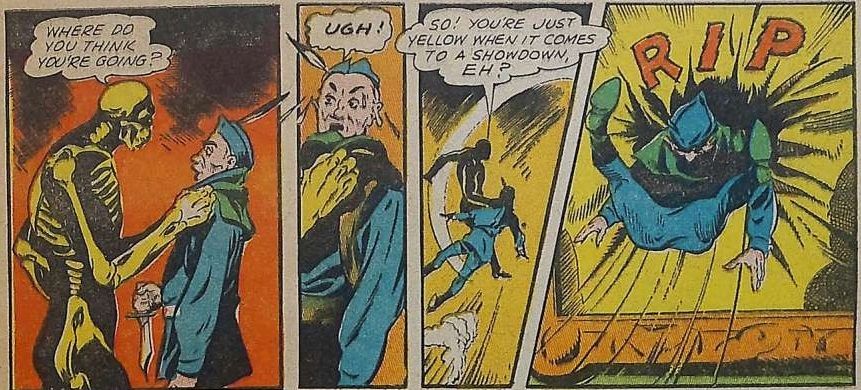
I know “rip” here is meant as a sound effect, but given that this guy’s legs have clearly detached from his torso, I’m going to assume Yankee killed him and it really says R.I.P.
This was Yankee’s last original outing. After this, it was all reprints and collected editions. Who thought this was worth collecting? I do not know.
Who is Responsible for This?
Quite a few people, actually. Let’s start with publishers.
Yankee’s original publisher was Chesler. Founder Harry “A” Chesler (like Truman’s “S,” the middle initial doesn’t stand for anything) was one of the first to provide original content for comic books, in the mid-1930s. Prior to that, comics were mainly reprints of newspaper comic strips. So even if Yankee Doodle Jones is bad (and he is so, so bad), without Chesler around to show the viability of comics, we may never have had decent superheroes — or, indeed, superheroes at all.
Hello Pal Comics was published by Harvey Comics, probably best remembered for creating Richie Rich.Then Chesler took him back to reprint the story from Yankee Comics #3 in Bullseye Comics #11 (but with nicer coloring). Apparently, Chesler loaned Yankee out to another publisher for a grand total of one issue. That really is an indication of how much the industry has changed since the early days. Imagine Marvel cancelling a book and then allowing DC to play with the characters in it!
As for Yankee’s creator, I’m honestly stumped. I went to three different websites and got three different answers. Comic Book Plus, where I read the issues discussed here, says that Charles Sultan and “George Sultan” (possibly a pseudonym shared by Sultan and fellow artist George Tuska) created Yankee. The Public Domain Super Heroes Fandom Wiki credits Lou Fine. Comic Vine lists his creators as “none,” which I’m reasonably sure is not true. I would not, however, be surprised to learn that no one wanted to be associated with this.
A couple of points of interest about these options: according to Classics Illustrated: A Cultural History, 2d ed, Charles Sultan and Lou Fine were brothers-in-law. It’s possible they worked together or bounced ideas off each other, either officially or unofficially. Also, Lou Fine was a big influence on Joe Simon and Jack Kirby, who created Captain America a few months prior to Yankee’s debut, and George Tuska is fondly remembered for his iconic run on Iron Man in the ’60s. So even if either or both of them is responsible for Yankee Doodle Jones, at least they also gave us some good superhero comics, too.
It’s also worth mentioning that Charles Sultan, as noted by David Hajdu in his book The Ten-Cent Plague, was one of innumerable creators pushed out of comics during the purge in the 1950s. Whatever one may think of Yankee Doodle Jones, losing your job because of a bunch of religious moralizers and publicity-hungry politicians is terrible. Fortunately, he seems to have landed on his feet, finding work as an artist and editor for various magazines. Fine also left comic books, switching over to comic strips and advertising far before the backlash set in.
Will Yankee Doodle Come Back to Town?
Yankee Doodle Jones really would have worked better as the monster in a horror comic, a darkly humorous take-that to the squeaky-clean, star-spangled heroes that proliferated at the time. A man with no name and no past who undergoes horrific government experiments and becomes increasingly brutal until even his handlers lose control, ending up in his crosshairs as a “threat to democracy,” makes way more sense than whatever is going on here.
This would not have worked in the hyper-patriotic ’40s, of course, but it might work today. Just imagine: a Nazi saboteur stalks the night, preparing to destroy the Allies’ latest secret weapon. He pulls a bomb from his coat, ready to plant it and run, when all of a sudden, out of the shadows, an eerie whistling chills the night air. The Nazi turns…his eyes widen…a menacing shadow falls over him…the Nazi screams…fade to black!
On second thought, that probably wouldn’t work either. But it would not-work less than the original concept.






























:quality(85):upscale()/2025/05/19/981/n/1922564/93076eb0682bb18c994e06.89379902_.png)

:quality(85):upscale()/2025/05/23/715/n/1922564/1e63d6e168309df259d956.72331408_.png)



